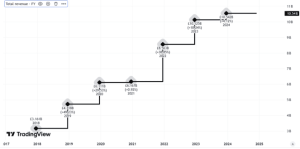If EVs are the future, perhaps it was inevitable the notorious DeLorean would be reimagined yet again, this time with an all-electric powertrain.
The gull-winged time-traveling machine that essentially shared marquee billing with “Back to the Future” stars Michael J. Fox and Christopher Lloyd is being resurrected in Texas by a group known for its work with China-backed luxury EV startup Karma Automotive.
They’ve teamed with Stephen Wynne, who acquired the DeLorean branding rights in the 1990s and has made a few attempts at a revival before now.
DeLorean launched teasers around Super Bowl LVI, inviting viewers to sign up for more news on the car’s all-electric relaunch coming sometime this year.
The promo indicated the name, or at least some branding, will be DeLorean EVolved. Expected pricing was not revealed.
Production is slated for San Antonio, according to a promotional release from an economic development association for the city, which says it expects 450 new jobs.
“San Antonio boasts a growing component and vehicle manufacturing sector as well as a wide array of global advanced manufacturing operations. A deep talent pool and a strong local academic ecosystem will foster further innovation,” said Joost de Vries, CEO of DeLorean Motor Company, in the release.
Fame has historically helped and hurt the brand. The original gained notoriety in the early 1980s for its spotty, highly-publicized quality issues and for the legal woes of its creator, the late John DeLorean. But then the “Back to the Future” film franchise turned it into a pop-culture icon.
Autoweek, assessing the EV design revealed in glimpses in the promo, wonders if the distinct sharp angles of the original are preserved in this reboot. Those telltale gull-wing doors? They remain.
Already, after-market EV conversions of the vintage model are out there for the right price, Autoweek added.
“Like any EV startup, we view DeLorean’s efforts with healthy skepticism. But what better choice for a futuristic EV than a car whose powertrain was replaced by a highly efficient fusion generator?” jokes Byron Hurd, writing for AutoBlog.
“Too bad Marty McFly traveled forward to 2015 and ruined the timeline for the rest of us, eh?” wrote Hurd. “Or maybe Marty was just here stealing Tesla’s
TSLA,
“falcon door” design, since Tesla fans are already coming out of the woodwork to declare the design a ripoff. It’s OK; most of them weren’t even alive in ’85.”
No doubt, EVs were a dominant theme of this year’s Super Bowl ad blitz.
Seven different auto brands aired eight commercials, with six focused solely on their electric offerings, leading up to and during Sunday’s game. One make and model topped all others in luring would-be EV buyers to the Cars.com shopping marketplace, and it’s certainly more mainstream than the DeLorean: Kia’s
000270,
EV6 crossover SUV.
Don’t miss: Flurry of EV commercials during Super Bowl led to huge jump in searches for this particular SUV
Unique offerings made their mark, too. The Volvo-linked Polestar 2 had a “massive spike” in traffic, propelling this lesser-known offering at one point to the No. 1 spot on Cars.com’s most-visited list during the Super Bowl after its commercial aired. The vehicle’s blend of “high tech and modern Swedish styling” is meant to position the Polestar 2 as an answer to the Tesla Model 3, Car and Driver says.
More Sustainable Investing: There’s a smart way to invest in the clean-energy transition right now (and not just EVs, solar and wind)
Market tracker LMC Automotive expects EVs to make up 34.2% of new U.S. vehicle sales by 2030, with all-electric at 30.1% and plug-in gas/electric hybrids at 4.1%. Sales of EVs, including plug-in hybrids, were only about 4% of total U.S. vehicle sales in 2021. Still, that marked a doubling of growth from just a year earlier.
This post was originally published on Market Watch






